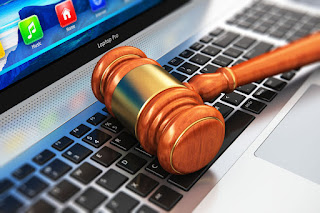US President Joe Biden : ''It's time to strengthen privacy protections, ban targeted advertising to children, and demand that tech companies stop collecting personal data on our children.''
And then as Russians missiles rain on Ukraine, there's another battle brewing - in the cybersphere. Destructive malware has flooded hundreds of Ukrainian websites and computers since Vladimir Putin announced his invasion.
It would be a mistake to assume that such attacks will remain limited to Ukrainian targets. Last week President Biden warned Mr. Putin against Russian cyberattacks on United States infrastructure.
Digitisation is in just about every field - social, personal commercial, governmental - and rules were needed and are needed to regulate what was the increasingly pervading means of business and societal interaction and warfare.
The social media platforms have since then only taken a life of their own beyond the perfunctory WhatsApp - Facebook, Twitter, Instagram and YouTube are the pervasive mediums of the alternate metaverse.
Businesses, commerce, online banking and shopping, as indeed portals as levers of governance and the news and information media indeed, have all coalesced into an online parallel meta-world.
Just as laws were needed to manage and regulate society while differentiating between communal and individual rights and responsibilities this world too needs regulation and management leading to security and assurance of individual rights, freedoms and responsibilities and those that a society undertakes together to ensure a safe and secure environment of its functioning.
But, just about everywhere, especially in the developing world, the state has tended to overplay its hand using regressive laws in controlling and managing the media - print initially and electronic lately - turning it into a battle for freedoms.
This shrouds the crime that has inevitably accompanied such varied means of societal engagement. Personal reputations, sleaze and exploitation is at its peak as criminality overtakes freedom using to engage in rampant exploitation of the vulnerable.
These include young children who are sexually exploited, women who are maligned and assaulted and the vulnerable segments who are scared into submitting before the demands of those who harass and exploit them.
NEXT, as business goes digital and transactions take place online it makes the entire business and banking system vulnerable to those criminals who are out to hack their way into fraudulently embezzling and stealing money from people's accounts.
Criminals have a field day where laws are either or unclear, or the system and capacity to investigate is inadequate or the capability of the courts to adjudicate such crimes is limited.
Just as 'Ease of Doing Business' is an important index for foreign investors so is the need for clear enunciation of what constitutes crime in their field of work and what recourse is available to them in law where a wrong seems to have been committed, especially when business is digitized.
Cyber-war isn't a buzzword any longer. It is an accepted and recognized form of war for which nations prepare as effectively and as innovatively as for a conventional war.
It is used for espionage, sabotage, incitement, fragmentation, diffraction and sowing suspicion in a system. It is also used for direct attacks in either suspending or denying use of a system or a service for a period long enough for the enemy to suffer the consequences and deliver implicit gain to the employing side.
It inhibits and interdicts industry, economy, supply-lines traffic, services, banking or any amount of modern societal functions which can put a city or targeted zone out of routine functioning for days at a stretch.
It accompanies conventional war as an additional and active form of parallel war which augments the damage with its destructive potential and causes a lag in the enemy's system of forces and functioning. These are disabling mechanisms in a war.
THESE need to be defined clearly in law and labeled 'acts of war' while annotating who all and in what all ways could be the accomplices and therefore must be dealt with accordingly.
Clearly as serious a business must differentiate between what constitutes a daily freedom for the likes of the press and the media and treat those separately from the real culprits of the state and the people to avoid innocents being harnessed under war crimes.
Else, this imperative may just fall through the chasm created with agitation in the name of freedom against a broad-based formulation as it stands.
The Master Essay continues. The World Students Society thanks authors Shahzad Chaudhary, and Glenn S. Gerstell.

.png)


0 comments:
Post a Comment
Grace A Comment!